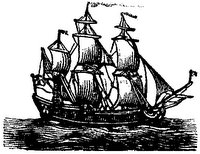 Yesterday I wrote that I don’t know what American prisoner the British gave up for the young midshipman John Loring. But I know it wasn’t privateer captain Consider Howland, even though that man was originally supposed to be part of the deal.
Yesterday I wrote that I don’t know what American prisoner the British gave up for the young midshipman John Loring. But I know it wasn’t privateer captain Consider Howland, even though that man was originally supposed to be part of the deal.Howland, born in Plymouth in 1745 and given an old family name, was master of the Washington, which sailed out on 2 Dec 1775. And was captured the very next day, as the Pilgrim Hall Museum explains.
Howland and his fellow prisoners were sent to Britain on board the same ship as Ethan Allen and other Americans captured while invading Canada. Many of them died of disease during the voyage, and others got pressed into service in the Royal Navy. Most of the rest were then sent back across the Atlantic to Halifax to be ready for a prisoner exchange.
Howland and some comrades escaped from jail there, but the British authorities recaptured him. In September 1776, when John Loring was probably annoying neighbors in Framingham, Howland, Allen, and some prisoners from the Battle of Bunker Hill were all locked in one chamber of the Halifax jail.
After the British military took the city of New York in a series of battles that fall, the Commissary of Prisoners had Howland and other captives brought south and incarcerated on ships moored off Brooklyn. At that time those ships were probably no worse than the other places they had been held—in later years the New York prison ships would become infamous.
Royal officials let Howland go on 25 Dec 1776, after slightly more than a year in custody. They ordered him to travel to Boston to be exchanged for Midshipman Loring—who was, oddly enough, the little brother of the British Commissary of Prisoners, Joshua Loring, Jr. (His wife, Elizabeth Loring, was becoming notorious as the mistress of Gen. Sir William Howe.)
However, when Howland arrived in Massachusetts, he discovered that the young midshipman had already been exchanged for someone else. In a letter dated 1 Feb 1777, the Commissary of Prisoners told Howland that he should still consider himself as on parole, bound by oath not to take part in the war. He wouldn’t be legally free until he was traded for a prisoner to be named later. After seven months Howland was exchanged for Capt. Gideon White, another Plymouth man who was loyal to the British.
In July 1780 Capt. Consider Howland received the command of the privateer Phoenix, a schooner that carried “2 carriage guns, 6 swivel guns & 12 men.” It was lost at sea that fall. His brother’s headstone in Plymouth contains the additional notice:
In memory of Consider Howland who was lost at sea Octr 1780 aged 35 years.
No comments:
Post a Comment